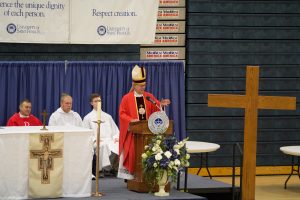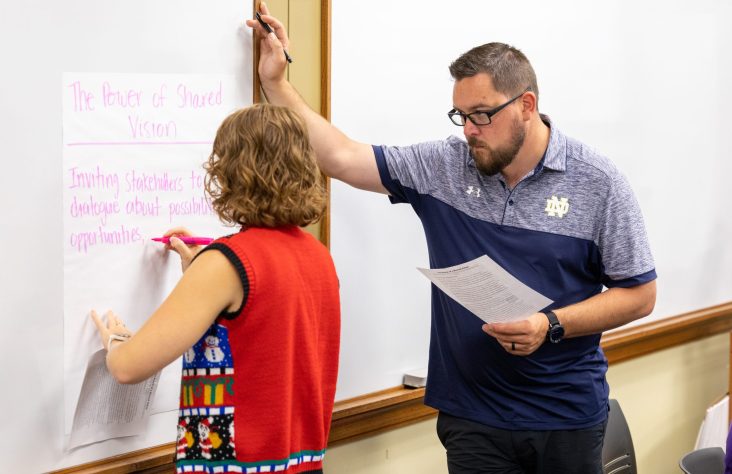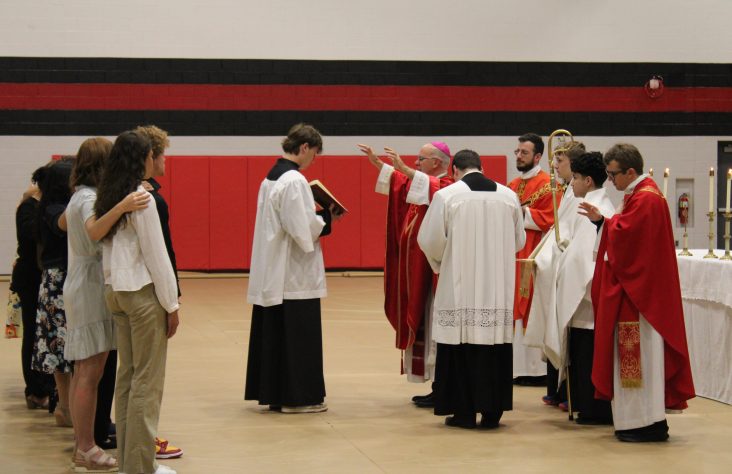September 6, 2017 // Bishop's Column: In Truth and Charity
Students invited to be ‘radicals’
The following is the homily delivered by Bishop Rhoades at the Mass of the Holy Spirit for the beginning of the academic year at the University of Saint Francis on August 30th.
Click here for more photos from this event.
As you begin this new academic year, I invite you to reflect on the amazing words of Jesus in today’s Gospel: “you are the salt of the earth” and “you are the light of the world.” I call these words amazing because they were addressed by Jesus to a crowd of peasants on a hill in Galilee, a people and a place considered of little or no importance in the Roman Empire. Imagine the reaction of these people to this description of them as the salt of the earth and the light of the world. These words are also meant for you and me.

Bishop Rhoades gives University of Saint Francis students their first spiritual homework assignment of the academic year. — Nick Stump
We are to be the salt of the earth. Salt gives flavor and it can be used to preserve food. Jesus is telling us that we are to bring flavor and preserve goodness in the world, like salt does to food.
Jesus tells us we are the light of the world. In the Jewish tradition, Israel was to be a light to the nations. Christians are to fulfill this role by living the teachings of Jesus in such a way that the darkness of sin is overcome by the light of Christ, by His love. Others and the world are impacted by the way we live our lives. When we fail to be light, the world suffers. When we are light, when we imitate Christ’s love, mercy, and generosity, the world becomes a better and brighter place. The Kingdom of God is advanced.
Students of the University of Saint Francis, don’t listen to those who say you can’t make a difference in the world. Listen instead to the words of the One who is Truth itself, the One who says to you: “You are the salt of the earth. You are the light of the world.”
Just think of the impact of this university in our city, our county, and beyond if we live what we pray in the Prayer of Saint Francis: “Lord, make me an instrument of your peace. Where there is hatred, let me sow love; where there is injury, pardon; where there is doubt, faith; where there is despair, hope; where there is darkness, light; where there is sadness, joy.”
The Prayer of Saint Francis kind of summarizes the Christian life, how disciples of Jesus are to live and act in this world. This is how we become the salt of the earth and the light of the world. We reject hatred in all its forms, including the poison of racism, by sowing love. We reach out to those who are hurting. We offer forgiveness to those who offend us. We bring the joy of the Gospel to those who are mired in sadness. Do you ever think how radical this is, how radical it is to really live the Christian life? It’s a radical choice. I’m inviting you to be radicals.
What does the word “radical” mean? It comes from the Latin word “radix,” which means root. Jesus was a radical — He got deep down to the root and heart of things. Here’s a suggestion for your reading this year: I invite you this year to choose one of the four Gospels and read it from beginning to end, maybe a few paragraphs a day and read it with fresh eyes. What will you find? You’ll find that Jesus was a radical and His life and teachings are a radical invitation to live life differently.
We can life superficially and not deeply, not down to the roots and core of things. And what happens? We get bored and our lives become mediocre. That’s not what Jesus wants. He wants us to have life and to live life to the full. He wants us to be truly happy. But if we live life with other purposes, just to be comfortable or to have material pleasures, or so that we are popular and liked by other people, our lives become superficial. Jesus is calling us to something much greater. He doesn’t call us to mediocrity. He calls us to live life on a higher plane. That’s the life of the Gospel. That’s how we become the salt of the earth and the light of the world.
You are called to be salt and light right here and now in your lives at this university, not just later after graduation. Think about the way you live, how you spend your time, how you use the gifts and talents God has given you, how you serve God and others. This isn’t a time to be selfish. When we’re selfish, we’re not happy. In fact, selfishness makes us miserable. Living the Gospel draws us out of ourselves, to live life with purpose, to find real joy, the joy that Jesus Christ offers us. He said: “I came that you might have life and have it to the full.”
I love the athletic images that St. Paul sometimes uses in his letters. In ancient Corinth, the Isthmian games were played every two years. They were modeled on the Olympics and were quite popular. St. Paul mentions two sports from the Isthmian games in our first reading today: track and boxing. Paul applies these sports to the Christian life. It is a race and a boxing match.
St. Paul tells us to “run so as to win.” I imagine we have some track-and-field athletes here. When you are in a race, you run so as to win. But you won’t win if you’re not in good shape, if you haven’t practiced and trained well. You won’t win if you haven’t disciplined your body and your muscles are weak. Paul also makes the point that he doesn’t run aimlessly. A runner in a race doesn’t just run any which way. He or she runs on course, heading the best and fastest way to the finish line.
St. Paul also makes a reference to boxing. I don’t know if you have a boxing team here at the University of Saint Francis. St. Paul tells the Corinthians that he’s not shadowboxing. In other words, he’s not faking it. Shadow boxing is when a boxer is just going through the motions, flailing the air. That’s fake boxing.
The point of these analogies is that we need to be disciplined in our Christian lives. We are to be focused on winning the race. This involves sacrifice. Jesus teaches clearly that His followers must take up their cross and follow Him. I hope you all will strive for excellence in your classes this year. I hope all you who are athletes will strive to be the best players you can be and work for victory in your competitions. Of course, you have to work hard to achieve excellence in academics, sports and other pursuits. But I invite you today to think about striving for excellence in your spiritual lives, in your lives of discipleship. What do we call an excellent disciple? A saint!
I think sometimes we Christians can be too lackadaisical about our faith, kind of aimless in our spiritual lives. We’re called to run the race, and not aimlessly. We need good training, spiritual exercises. We shouldn’t be fake shadow boxers. While here, I know you’ll be busy with classes and other activities, the education of your minds and bodies. But don’t forget the education of your souls, your spiritual life, your life in Christ. You’ll be spending a lot of time in classrooms. I invite you to spend some time in the classroom of silence to listen to the Master Teacher. That’s prayer.
Don’t settle for mediocrity in anything, least of all your lives of faith. You’re called to holiness, to become saints. Take time for prayer and for reading the Scriptures. If you’re Catholic, be faithful to Mass, go to confession, pray the rosary. Actually, even if you’re not Catholic, you can pray the rosary. And if you’re searching and want to learn more about Catholicism, I invite you to attend the RCIA through campus ministry here.
We all need to get in shape for the race, the race to the most important finish line, heaven. St. Paul writes about how winners in the popular races in Corinth sacrificed a lot to win a crown that is perishable. If they won the race, they were crowned with laurel or other flowered leaves. Paul says that in the race we run as Christians, the crown of victory is imperishable. It’s eternal life!
May the Lord bless you and your work and endeavors this year! Remember to run so as to win an imperishable crown. When you do, you will truly be the salt of the earth and the light of the world.
The best news. Delivered to your inbox.
Subscribe to our mailing list today.






